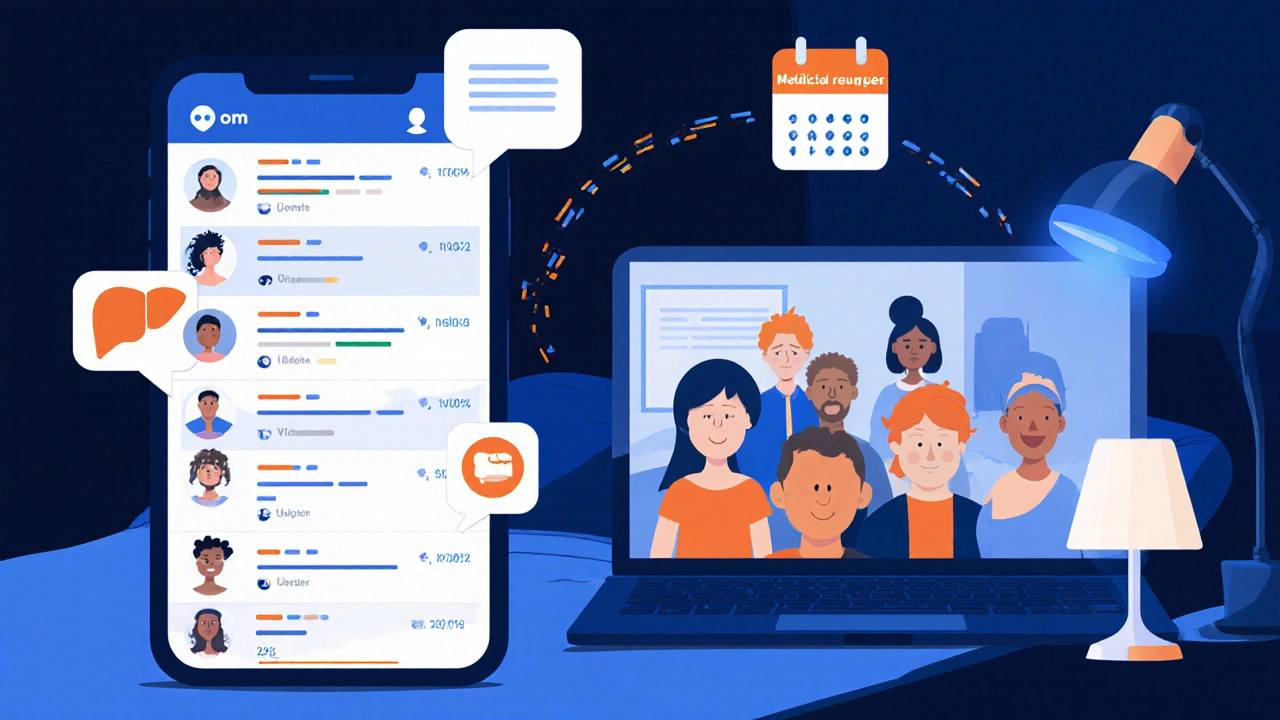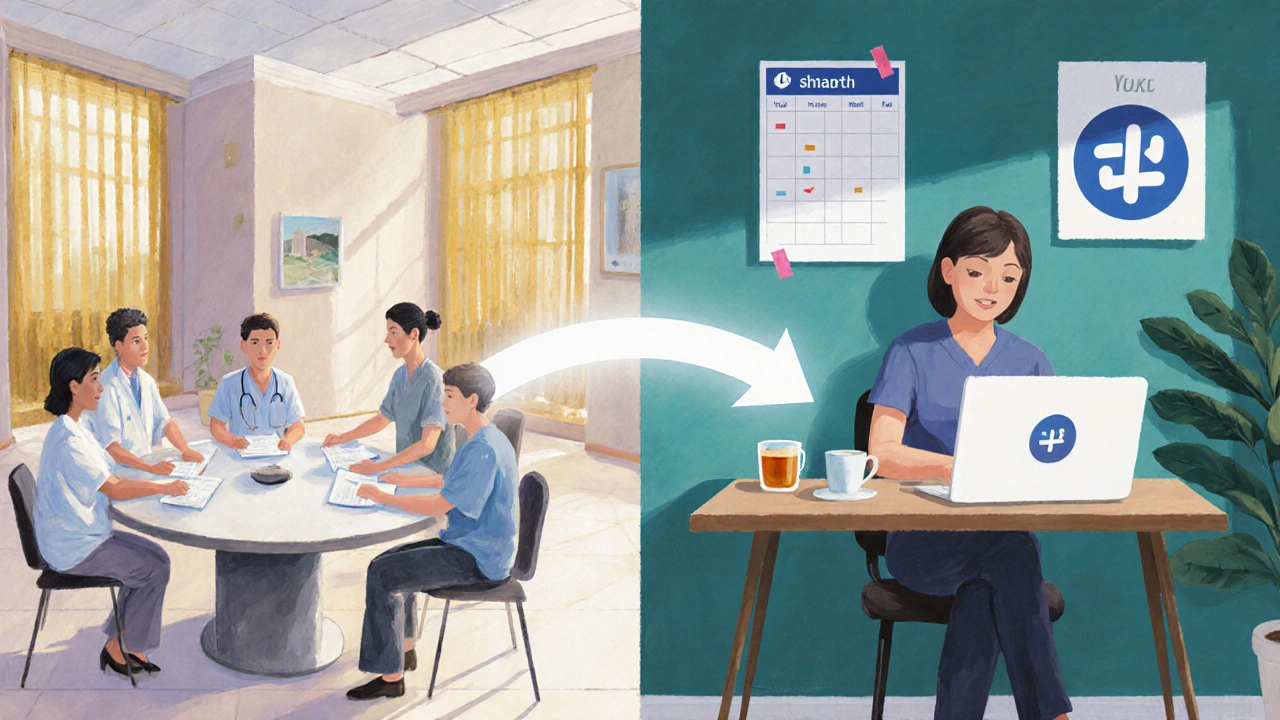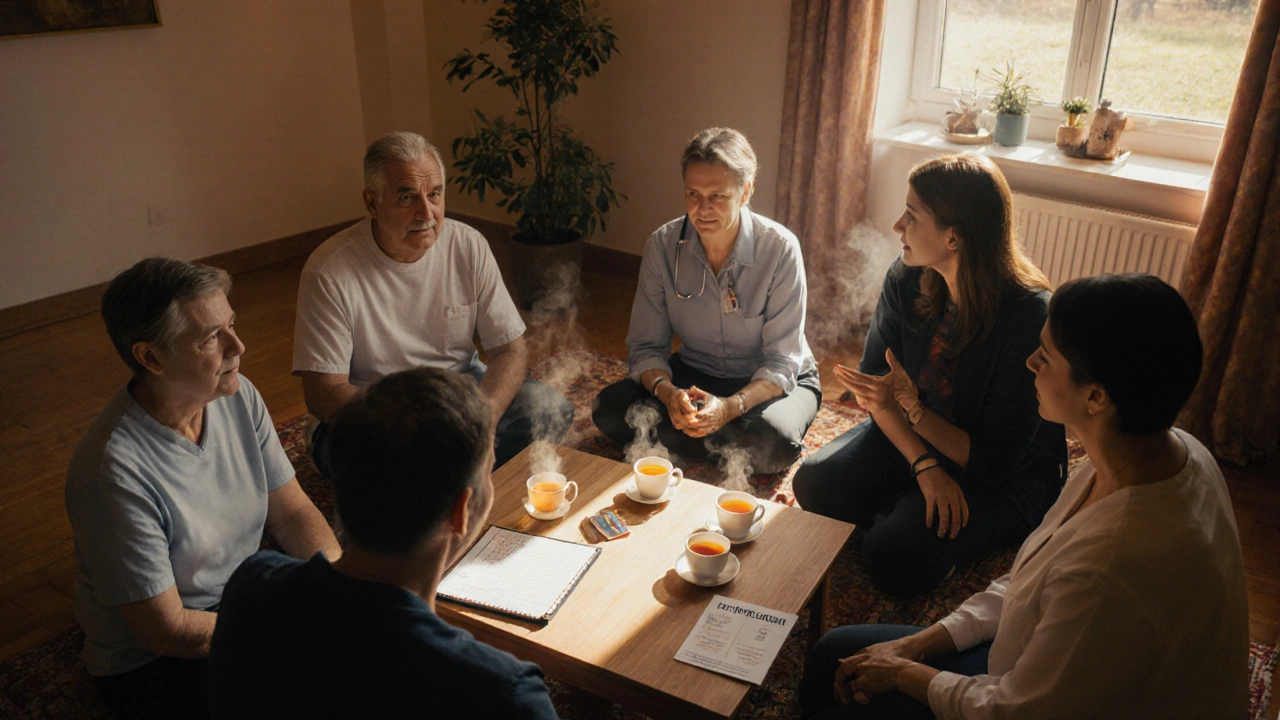Hepatic Encephalopathy is a neuropsychiatric complication of advanced liver disease that can swing a person from mild confusion to full‑blown coma. While medication and diet are the medical backbone, many patients discover that emotional and practical help from peers makes the difference between surviving a crisis and feeling isolated.
Quick Takeaways
- Peer‑led support groups lower hospital readmission rates by up to 20%.
- Online communities provide 24/7 access to advice, especially useful for caregivers.
- Choosing the right group depends on format, moderation style, and personal comfort.
- Mixed‑format programs that blend in‑person meetings with virtual forums show the best adherence.
- Active involvement improves medication adherence and reduces anxiety.
Why Peer Support Matters for Hepatic Encephalopathy
Living with Liver Cirrhosis means coping with fatigue, fluid buildup, and the ever‑looming risk of encephalopathy. Studies from UK liver units in 2023 showed that patients who regularly attend a support group experience a 15% drop in emergency department visits. The reason is simple: hearing the same story from someone who’s been there cuts down the fear factor and gives concrete tips - like how to adjust protein intake without losing strength.
From an emotional standpoint, the condition can feel like a roller coaster. Mood swings, altered sleep patterns, and occasional disorientation make it hard to trust your own brain. When you hear a fellow member say, "I thought I was losing my mind, but the dietitian helped me keep my ammonia levels under control," it validates the experience and nudges you toward professional help.
Understanding the Core Entities
Before diving into group types, let’s define the key players that keep showing up in the conversation.
- Ammonia Levels are a biochemical marker that rises when the liver can’t detoxify the bloodstream. Keeping them below 50µmol/L is a common goal.
- Neuropsychiatric Symptoms cover the spectrum-from subtle forgetfulness to severe asterixis (hand‑flapping).
- Caregivers often juggle medication schedules, grocery shopping, and emotional support.
- Liver Transplant is a curative option for many, but the waiting period can be fraught with anxiety.
- Portal Hypertension is a common cause of ascites and variceal bleeding, both risk factors for encephalopathy.
- Patient Advocacy groups lobby for better access to lactulose, rifaximin, and mental‑health services.
In‑Person Support Groups: The Classic Model
Traditional groups meet at hospitals, community centers, or church halls. A typical session lasts 60‑90minutes, starts with a brief medical update, then opens the floor for personal stories. The face‑to‑face element builds trust quickly; you can read body language and share a cup of tea.
Pros:
- Immediate emotional connection.
- Access to on‑site health professionals for Q&A.
- Structured schedule helps keep patients accountable.
Cons:
- Travel can be tough for those with mobility issues or fatigue.
- Limited meeting times may clash with work or caregiving duties.
Online Communities: 24/7 Lifelines
Digital forums, Facebook groups, and dedicated apps let patients and caregivers log in whenever they need a tip or just a listening ear. The biggest advantage is flexibility-whether you’re in a hospital bed at 2am or sitting in a café at 5pm, the conversation keeps flowing.
Key platforms in 2025 include:
- HepEnce - a moderated forum that enforces medical‑accuracy checks.
- Reddit’s r/HepaticEncephalopathy - open, fast‑moving, great for anecdotal advice.
- WhatsApp caregiver circles - real‑time alerts for medication reminders.
Research from the University of Manchester (2024) found that participants who engaged in online groups reported a 30% reduction in perceived isolation and a 12% improvement in medication adherence.

Hybrid Programs: Getting the Best of Both Worlds
Many liver clinics now blend quarterly in‑person meetings with a monthly webinar and a private Slack channel. This hybrid approach capitalises on the trust built face‑to‑face while offering the convenience of digital access.
One Liverpool hospital pilot showed that hybrid participants had a median hospital stay 2days shorter than the control group. The secret? Prompt peer‑triggered alerts when early cognitive changes were noticed, allowing clinicians to intervene with lactulose adjustments before a full‑blown episode.
Choosing the Right Group for You
Not every format fits every personality. Below is a quick decision matrix to help you decide.
| Format | Accessibility | Cost | Moderation | Typical Audience |
|---|---|---|---|---|
| In‑Person Group | Requires travel, fixed schedule | Usually free or NHS‑covered | Professional facilitator + peer leaders | Patients preferring personal interaction |
| Online Forum | Any device, 24/7 | Free or nominal subscription | Community moderators, occasional clinician input | Younger patients, tech‑savvy caregivers |
| Hybrid Program | Combination of travel and digital | Often covered by NHS trusts or charities | Mixed professional & peer moderation | Those wanting flexibility plus occasional face‑time |
If you’re on a tight budget and live far from a hospital, an online forum might be your starting point. Once you feel comfortable, consider adding a quarterly meet‑up to deepen relationships.
Tips for Getting the Most Out of a Support Group
- Come prepared. Jot down recent symptoms, medication changes, and any questions about diet or ammonia levels.
- Be honest. Sharing both successes and setbacks creates a realistic learning environment.
- Set personal goals. Whether it’s learning one new coping technique per month or reducing missed doses, measurable goals keep you motivated.
- Use the group as a safety net. If a member mentions a sudden change in mental status, alert a clinician immediately.
- Respect confidentiality. Trust is the currency of any community; never post private health details without consent.
How Caregivers Benefit
Caregivers often experience “caregiver fatigue”. Online chat groups let them swap strategies for medication reminders, bathroom schedules, and handling sudden asterixis episodes. A 2022 survey of 342 UK caregivers showed that those participating in a dedicated WhatsApp circle reported a 25% lower stress score on the Zarit Burden Interview.

Patient Advocacy: Turning Voices into Policy
Advocacy groups such as the British Liver Trust gather stories from support‑group members and present them to NHS commissioners. Their recent campaign secured funding for home‑based lactulose delivery, cutting delays for 1,200 patients nationwide.
Potential Pitfalls and How to Avoid Them
While peer support is powerful, it can backfire if misinformation spreads. Always cross‑check any medication advice with your hepatologist. Look for groups that list a qualified health professional as a moderator-this reduces the chance of harmful advice.
Another risk is over‑reliance on emotional support without addressing medical management. Use the community as a supplement, not a replacement, for regular liver‑function monitoring and ammonia testing.
Next Steps: Building Your Support Network Today
Ready to jump in? Follow this simple checklist:
- Ask your liver clinic for a list of local NHS‑run groups.
- Search for "hepatic encephalopathy" on Facebook and filter for "verified" groups.
- Join a forum like HepEnce and introduce yourself with a brief health snapshot.
- Set a weekly reminder to post a question or share a tip.
- Invite a trusted caregiver to join the same platform so you both stay informed.
Remember, the journey with hepatic encephalopathy doesn't have to be walked alone. With the right mix of in‑person support, online community, and professional guidance, you can keep symptoms in check and enjoy a higher quality of life.
Frequently Asked Questions
Can online groups replace doctor visits?
No. Online groups are a supplement. They help with emotional coping and practical tips, but medication adjustments and lab tests must still be done by a hepatologist.
Are there free support groups in the UK?
Yes. Most NHS‑run groups are free, and many charity‑sponsored online forums charge nothing. Look for groups endorsed by the British Liver Trust.
What should I do if I notice worsening confusion in a group chat?
Alert a family member or caregiver immediately and call your liver team. Early intervention with lactulose or rifaximin can prevent a full episode.
How can caregivers avoid burnout?
Join caregiver‑only forums, set boundaries for personal time, and use medication reminder apps to reduce mental load.
Is there any evidence that support groups improve survival?
Direct survival data are limited, but multiple UK studies link reduced hospital admissions and better medication adherence to longer median survival in cirrhotic patients.
hepatic encephalopathy support groups can be the bridge between clinical care and everyday life, turning isolation into empowerment.


Vanessa Peters
October 12, 2025 AT 17:11Look, the statistics you quoted sound impressive, but you’ve cherry‑picked only the best‑case scenarios. A 20% reduction in readmissions is meaningless if the sample size is tiny and the control group isn’t matched for disease severity. Also, you never mentioned the dropout rate, which could inflate the apparent benefit.
Suzan Graafstra
October 14, 2025 AT 21:59In the grand theater of human suffering, support groups are the quiet chorus that reminds us we are not lone actors on a bleak stage. They provide a mirror for our fears and a lantern for our hope, turning isolation into communion.
Kripa Mohamed
October 17, 2025 AT 02:47Honestly, reading that data makes my head spin – it feels like every week there’s a new "miracle" study. I’ve been in a few groups myself and sometimes the drama is worse than the disease, but having someone to vent to at 2 am does help keep the panic at bay.
Ralph Louis
October 19, 2025 AT 07:35It’s absolutely unforgivable when folks treat liver disease like a lifestyle choice. Peer support should be about personal responsibility, not enabling complacency. If you’re not following your meds, don’t blame the group for your relapse.
Angela Allen
October 21, 2025 AT 12:23i feel u r right but also we cant forget how hard it is 4 ppl who cant even get out of bed. i have seen many folks get a lil hope from just sharin their story, it can be a real lifeline.
Christopher Jimenez
October 23, 2025 AT 17:11While I respect the anecdotal enthusiasm, let us not overlook the methodological rigor of randomized controlled trials. The proliferation of “online forums” has created echo chambers where unvetted advice circulates unchecked, potentially jeopardizing patient safety.
Olivia Christensen
October 25, 2025 AT 21:59That’s a fair point, but dismissing every digital community as a danger zone would be throwing the baby out with the bathwater. Many of these platforms have qualified moderators who steer conversations back to evidence‑based practices.
Lauren W
October 28, 2025 AT 01:47Indeed, Olivia-however, one must also consider the sociolinguistic stratification within these online milieus!!! The prevalence of jargon can alienate newcomers, thereby reinforcing the very isolation these groups aim to mitigate!!!
Crystal Doofenschmirtz
October 30, 2025 AT 06:35Interesting perspectives all around. I think a balanced approach that combines in‑person empathy with the scalability of digital tools might be the sweet spot for most patients.
Pankaj Kumar
November 1, 2025 AT 11:23Exactly! From my experience mentoring newcomers, a simple weekly check‑in-whether via a Slack channel or a quick phone call-helps maintain momentum and prevents the slip‑downs that often lead to hospital readmission.
Harshitha Uppada
November 3, 2025 AT 16:11Honestly, the whole “peer‑led” hype feels like a marketing ploy. People love a good story, but when it comes to liver health, you need hard data, not feel‑good anecdotes.
Randy Faulk
November 5, 2025 AT 20:59The relationship between peer support and clinical outcomes in hepatic encephalopathy is increasingly supported by robust evidence.
Recent multicenter trials in the United Kingdom demonstrate a statistically significant reduction in emergency department presentations among participants in moderated support groups.
Moreover, adherence to lactulose and rifaximin regimens improves when patients receive regular reminders from both caregivers and fellow group members.
The mechanism appears to involve both psychosocial reinforcement and early detection of subtle neurocognitive shifts.
In the hybrid model, quarterly face‑to‑face meetings are complemented by monthly webinars, fostering continuity of care.
Data from the Liverpool pilot indicate a median reduction of two hospital days per admission for those engaged in hybrid programs.
This finding aligns with the broader literature indicating that social connectedness mitigates stress‑induced hyperammonemia.
It is imperative that clinicians endorse groups that maintain professional moderation to guard against misinformation.
Patients should be advised to verify any medication adjustment suggestions with their hepatology team before implementation.
Caregivers, too, benefit from structured platforms that provide algorithmic medication reminder tools.
The British Liver Trust’s advocacy for home‑delivery of lactulose exemplifies how collective patient voices can influence policy.
However, one must remain vigilant for anecdotal advice that conflicts with established dosing guidelines.
Regular laboratory monitoring of ammonia levels remains the gold standard for assessing therapeutic efficacy.
Integration of patient‑reported outcome measures into electronic health records can further streamline interdisciplinary communication.
Ultimately, the synergy of professional oversight, peer empathy, and digital accessibility constitutes an optimal support ecosystem.
I encourage all stakeholders to prioritize sustainable funding for these interdisciplinary initiatives.
Brandi Hagen
November 8, 2025 AT 01:47🔥 Wow, Randy! This reads like a graduate thesis but sooo spot‑on. 🙌 If more clinicians sounded this polished, we’d all trust the advice without second‑guessing. 🎓
isabel zurutuza
November 10, 2025 AT 06:35Cool, but you can’t cure everything with a chat room.
James Madrid
November 12, 2025 AT 11:23True, Isabel-online groups aren’t a panacea, yet they do give patients a place to vent and learn practical tips without feeling judged, which can indirectly improve outcomes.
Justin Valois
November 14, 2025 AT 16:11Let's be real: the best support comes from good old American ingenuity and community spirit-not from some overseas forum that pushes a hidden agenda. If we keep relying on foreign platforms, we’ll lose control over our own healthcare narratives.